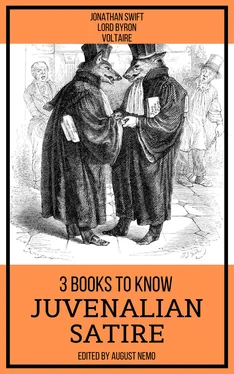Should suck him back to her insatiate grave:
And there he lay, full length, where he was flung,
Before the entrance of a cliff-worn cave,
With just enough of life to feel its pain,
And deem that it was saved, perhaps in vain.
With slow and staggering effort he arose,
But sunk again upon his bleeding knee
And quivering hand; and then he look'd for those
Who long had been his mates upon the sea;
But none of them appear'd to share his woes,
Save one, a corpse, from out the famish'd three,
Who died two days before, and now had found
An unknown barren beach for burial ground.
And as he gazed, his dizzy brain spun fast,
And down he sunk; and as he sunk, the sand
Swam round and round, and all his senses pass'd:
He fell upon his side, and his stretch'd hand
Droop'd dripping on the oar (their jurymast),
And, like a wither'd lily, on the land
His slender frame and pallid aspect lay,
As fair a thing as e'er was form'd of clay.
How long in his damp trance young Juan lay
He knew not, for the earth was gone for him,
And Time had nothing more of night nor day
For his congealing blood, and senses dim;
And how this heavy faintness pass'd away
He knew not, till each painful pulse and limb,
And tingling vein, seem'd throbbing back to life,
For Death, though vanquish'd, still retired with strife.
His eyes he open'd, shut, again unclosed,
For all was doubt and dizziness; he thought
He still was in the boat and had but dozed,
And felt again with his despair o'erwrought,
And wish'd it death in which he had reposed;
And then once more his feelings back were brought,
And slowly by his swimming eyes was seen
A lovely female face of seventeen.
'T was bending dose o'er his, and the small mouth
Seem'd almost prying into his for breath;
And chafing him, the soft warm hand of youth
Recall'd his answering spirits back from death;
And, bathing his chill temples, tried to soothe
Each pulse to animation, till beneath
Its gentle touch and trembling care, a sigh
To these kind efforts made a low reply.
Then was the cordial pour'd, and mantle flung
Around his scarce-clad limbs; and the fair arm
Raised higher the faint head which o'er it hung;
And her transparent cheek, all pure and warm,
Pillow'd his death-like forehead; then she wrung
His dewy curls, long drench'd by every storm;
And watch'd with eagerness each throb that drew
A sigh from his heaved bosom—and hers, too.
And lifting him with care into the cave,
The gentle girl and her attendant,—one
Young, yet her elder, and of brow less grave,
And more robust of figure,—then begun
To kindle fire, and as the new flames gave
Light to the rocks that roof'd them, which the sun
Had never seen, the maid, or whatsoe'er
She was, appear'd distinct, and tall, and fair.
Her brow was overhung with coins of gold,
That sparkled o'er the auburn of her hair—
Her clustering hair, whose longer locks were roll'd
In braids behind; and though her stature were
Even of the highest for a female mould,
They nearly reach'd her heel; and in her air
There was a something which bespoke command,
As one who was a lady in the land.
Her hair, I said, was auburn; but her eyes
Were black as death, their lashes the same hue,
Of downcast length, in whose silk shadow lies
Deepest attraction; for when to the view
Forth from its raven fringe the full glance flies,
Ne'er with such force the swiftest arrow flew;
'T is as the snake late coil'd, who pours his length,
And hurls at once his venom and his strength.
Her brow was white and low, her cheek's pure dye
Like twilight rosy still with the set sun;
Short upper lip—sweet lips! that make us sigh
Ever to have seen such; for she was one
Fit for the model of a statuary
(A race of mere impostors, when all 's done—
I 've seen much finer women, ripe and real,
Than all the nonsense of their stone ideal).
I 'll tell you why I say so, for 't is just
One should not rail without a decent cause:
There was an Irish lady, to whose bust
I ne'er saw justice done, and yet she was
A frequent model; and if e'er she must
Yield to stern Time and Nature's wrinkling laws,
They will destroy a face which mortal thought
Ne'er compass'd, nor less mortal chisel wrought.
And such was she, the lady of the cave:
Her dress was very different from the Spanish,
Simpler, and yet of colours not so grave;
For, as you know, the Spanish women banish
Bright hues when out of doors, and yet, while wave
Around them (what I hope will never vanish)
The basquina and the mantilla, they
Seem at the same time mystical and gay.
But with our damsel this was not the case:
Her dress was many-colour'd, finely spun;
Her locks curl'd negligently round her face,
But through them gold and gems profusely shone:
Her girdle sparkled, and the richest lace
Flow'd in her veil, and many a precious stone
Flash'd on her little hand; but, what was shocking,
Her small snow feet had slippers, but no stocking.
The other female's dress was not unlike,
But of inferior materials: she
Had not so many ornaments to strike,
Her hair had silver only, bound to be
Her dowry; and her veil, in form alike,
Was coarser; and her air, though firm, less free;
Her hair was thicker, but less long; her eyes
As black, but quicker, and of smaller size.
And these two tended him, and cheer'd him both
With food and raiment, and those soft attentions,
Which are (as I must own) of female growth,
And have ten thousand delicate inventions:
They made a most superior mess of broth,
A thing which poesy but seldom mentions,
But the best dish that e'er was cook'd since Homer's
Achilles ordered dinner for new comers.
I 'll tell you who they were, this female pair,
Lest they should seem princesses in disguise;
Besides, I hate all mystery, and that air
Of clap-trap which your recent poets prize;
And so, in short, the girls they really were
They shall appear before your curious eyes,
Mistress and maid; the first was only daughter
Of an old man who lived upon the water.
A fisherman he had been in his youth,
And still a sort of fisherman was he;
But other speculations were, in sooth,
Added to his connection with the sea,
Perhaps not so respectable, in truth:
A little smuggling, and some piracy,
Left him, at last, the sole of many masters
Of an ill-gotten million of piastres.
A fisher, therefore, was he,—though of men,
Like Peter the Apostle,—and he fish'd
For wandering merchant-vessels, now and then,
And sometimes caught as many as he wish'd;
The cargoes he confiscated, and gain
He sought in the slave-market too, and dish'd
Full many a morsel for that Turkish trade,
By which, no doubt, a good deal may be made.
He was a Greek, and on his isle had built
(One of the wild and smaller Cyclades)
A very handsome house from out his guilt,
And there he lived exceedingly at ease;
Heaven knows what cash he got or blood he spilt,
A sad old fellow was he, if you please;
But this I know, it was a spacious building,
Full of barbaric carving, paint, and gilding.
He had an only daughter, call'd Haidee,
The greatest heiress of the Eastern Isles;
Besides, so very beautiful was she,
Her dowry was as nothing to her smiles:
Читать дальше












